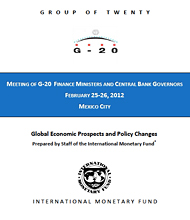Group of Twenty -- Meeting of G-20 Finance Ministers and Central Bank Governors
IMF Note on Global Economic Prospects and Policy Changes
February 25-26, 2012, Mexico City
About the Executive Summary
The Following executive summary is from a note by the Staff of the IMF prepared for the February 25-26, 2012 meeting of the Group of Twenty Finance Ministers and Central Bank Governors in Mexico City.
Read the Full text ![]()
Executive Summary
The global recovery suffered a setback and despite recent improvements remains subject to major downside risks. Global activity will slow in 2012. The euro area is still expected to enter a mild recession, and other advanced economies are likely to experience weak and bumpy growth. In emerging economies, growth is expected to continue moderating, reflecting past policy tightening and adverse spillovers from advanced economies.
Risks to global growth remain squarely to the downside, although recent policies and financial market developments have lowered the probability of a sharp global slowdown. The overarching risk remains an intensified global "paradox of thrift" as households, firms, and governments around the world reduce demand. This risk is further exacerbated by fragile financial systems, high public deficits and debt, and already-low interest rates, making the current environment fertile ground for multiple equilibria—self-perpetuating outcomes resulting from pessimism or optimism, notably in the euro area. Other key risks include hard landings in emerging economies and sharply higher oil prices, driven by geopolitical-related supply concerns.
The euro area must build on recent measures and act decisively on multiple fronts to achieve a successful resolution to the crisis. Fiscal consolidation should be structured to avoid a decline in demand, and countries with fiscal space should reconsider the pace of near-term adjustment. Euro area members benefiting from financial assistance programs should stick to the agreed consolidation efforts. The adverse effects of fiscal consolidation on growth should be mitigated by other policies: easier monetary policy; bank recapitalization to support credit; and structural and institutional reforms to address the root causes of the crisis. Deft crisis management is required. The ECB’s 3 year LTRO has improved market sentiment, relieving pressures on euro area banks and sovereigns. Sufficient liquidity should be provided, by expanding the ECB’s balance sheet and augmenting resources for the European Financial Stability Facility (EFSF) and the European Stability Mechanism (ESM). Importantly, to underpin the sustainability of the common currency deeper financial and fiscal integration over the medium term is required.
In other advanced economies, there remains an urgent need to set out a credible path for fiscal consolidation over the medium term. Sufficient adjustment is planned in most advanced economies in the near term. If downside risks to growth materialize, countries with fiscal space should allow automatic stabilizers to operate fully. Countries that can afford it may consider slowing fiscal adjustment in 2012, while maintaining their commitment to a credible medium-term consolidation plan. Monetary policy should remain highly accommodative—through unconventional measures, if necessary.
In emerging economies, the priority is to ensure a soft landing as domestic growth slows amid a deteriorating external environment and volatile capital flows. Monetary policies can be eased in economies with diminishing inflationary pressure (e.g., Latin America) and, where necessary, should be complemented with macro-prudential measures and enhanced financial supervision to insure against overheating in some sectors (e.g., real estate). There is scope to increase expenditure—including, in some cases, social spending—in economies where inflation pressure is expected to ease, fiscal positions are sound, and external surpluses are large (e.g., China). In those economies with relatively high inflation and public debt, policy space is more limited, warranting a more cautious stance toward policy easing (e.g., India).
Collective action to address global imbalances can help ensure a return to strong, sustainable, and balanced growth. This will require further deleveraging by households in advanced deficit economies, and policies encouraging more inclusive growth and lower saving in emerging surplus economies—through financial sector reform, enhanced pension, healthcare, and education policies, and less intervention in foreign exchange markets.

